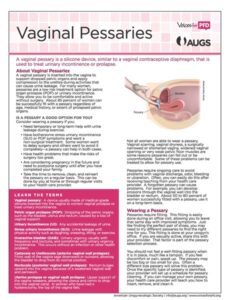 Your doctor may recommend a device which gets inserted into your vagina to provide urethral support and compression. For example, a tampon, urethral plug, or pessary.
Your doctor may recommend a device which gets inserted into your vagina to provide urethral support and compression. For example, a tampon, urethral plug, or pessary.
A pessary is a plastic device, similar to a vaginal contraceptive diaphragm. It is a low risk treatment option, which either lifts the bladder or apply compression to the urethra during activities that can cause leakage. Vaginal pessaries can help:
- Pelvic organ prolapse (POP): Provide support for vaginal or uterine prolapse.
- Bladder control problems: The ring pessary, an inexpensive, easy-to-manage, and widely available option, is effective treatment for both stress urinary incontinence and overactive bladder.
- Bowel control problems: Help to improve bowel control symptoms.
There are numerous shapes and sizes of pessaries to meet the individual support requirements of different patients. Seeking care from a provider with a wide selection of pessaries may improve the chances of getting a comfortable fitting pessary.
Women who use a pessary may also be prescribed vaginal estrogen cream, tablets or a ring to strengthen the vaginal skin, especially for those in menopause. This reduces the risk of vaginal skin erosion or ulceration.
Pessaries are a low risk treatment option when compared to surgery for symptomatic UI. However, pessaries require ongoing care to avoid problems with vaginal infection, ulceration or bleeding. A neglected pessary can result in erosions through the vaginal wall into the bladder or rectum. About half of the women who are successfully fitted with a pessary continue to use it on a long-term basis.
Are You a Good Candidate for a Pessary?
Not all women can have their symptoms successfully controlled by a pessary. Situations such as vaginal scarring, a surgically narrowed or shortened vagina or very weak pelvic floor muscles can cause pessaries to fall out or be uncomfortable. Is a pessary a good option for you? Typical incontinence pessary users are women who:
- Need temporary help with urine leakage during exercise.
- Have mild symptoms and want to avoid surgery for the moment.
- Have health problems that make the risks of surgery too great.
- Need to delay surgery and are uncomfortable from their incontinence.
- Are willing to invest the time to remove, clean, and reinsert the pessary on a regular basis. If you are not willing to care for a pessary, it is not a good option for you.
